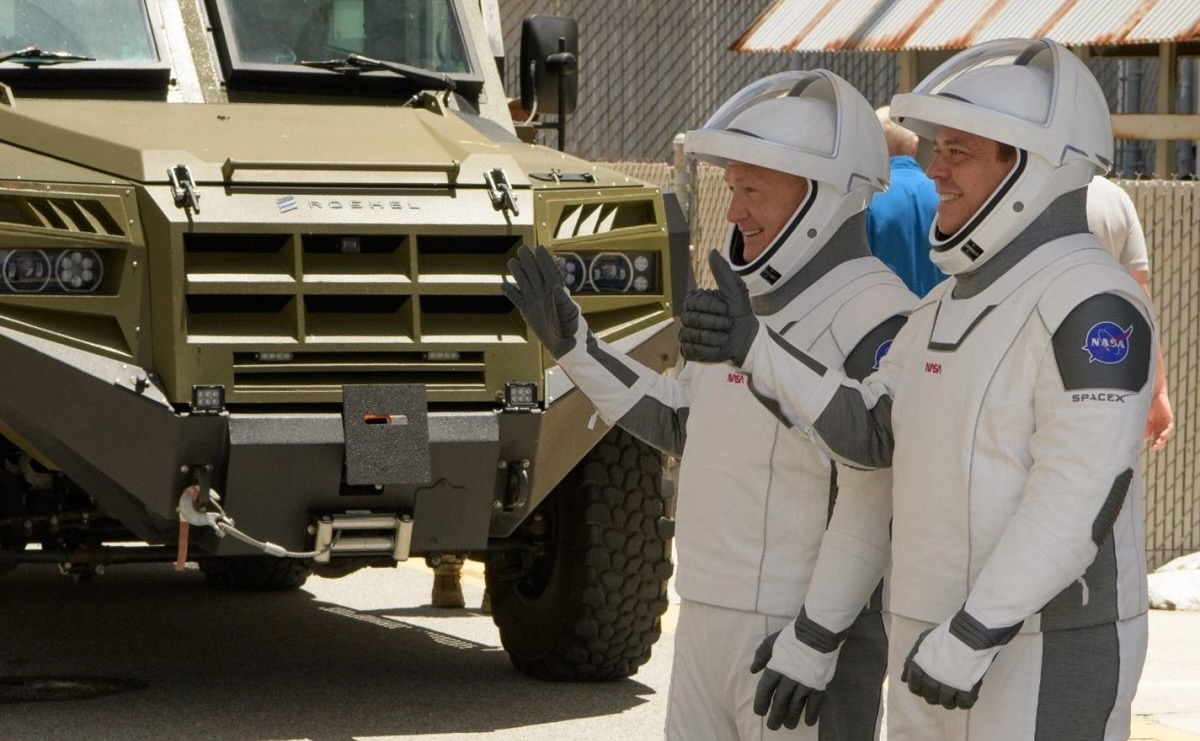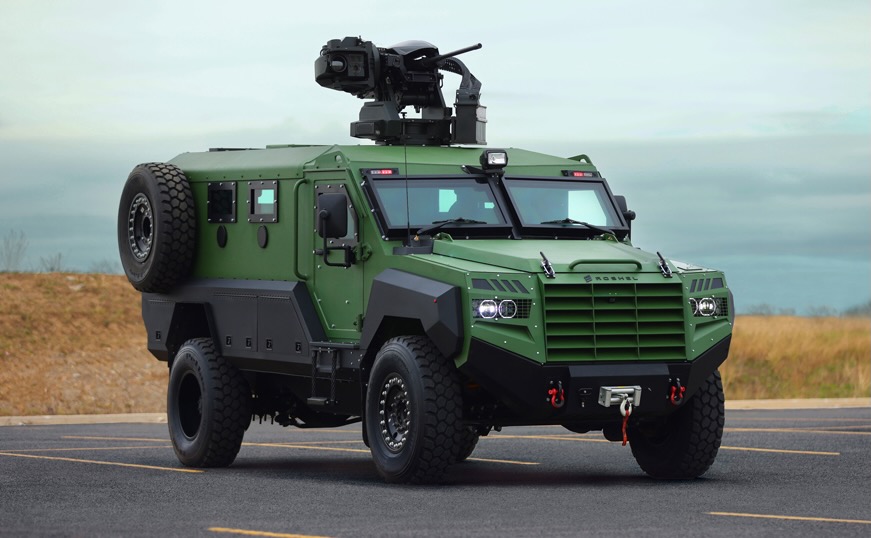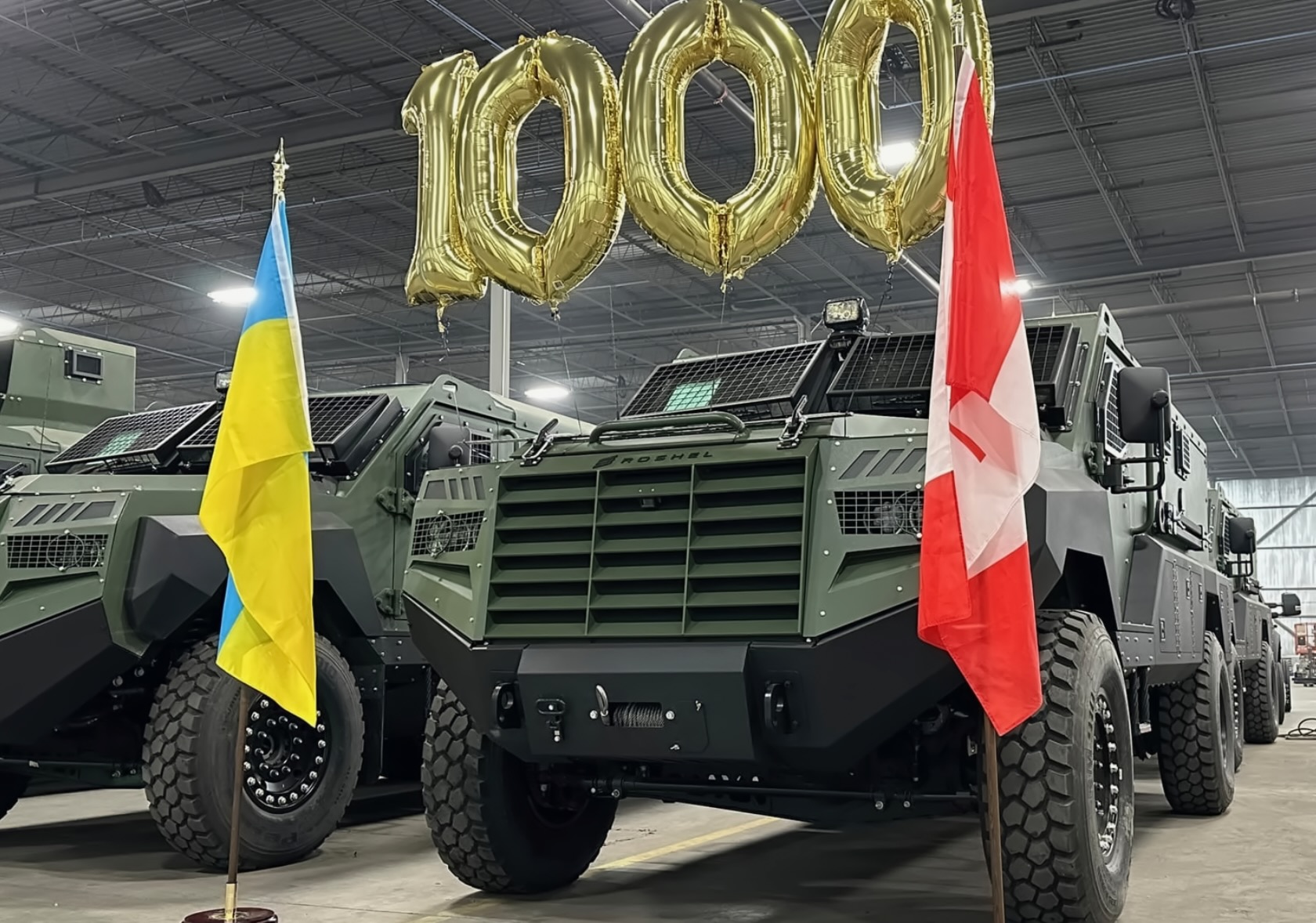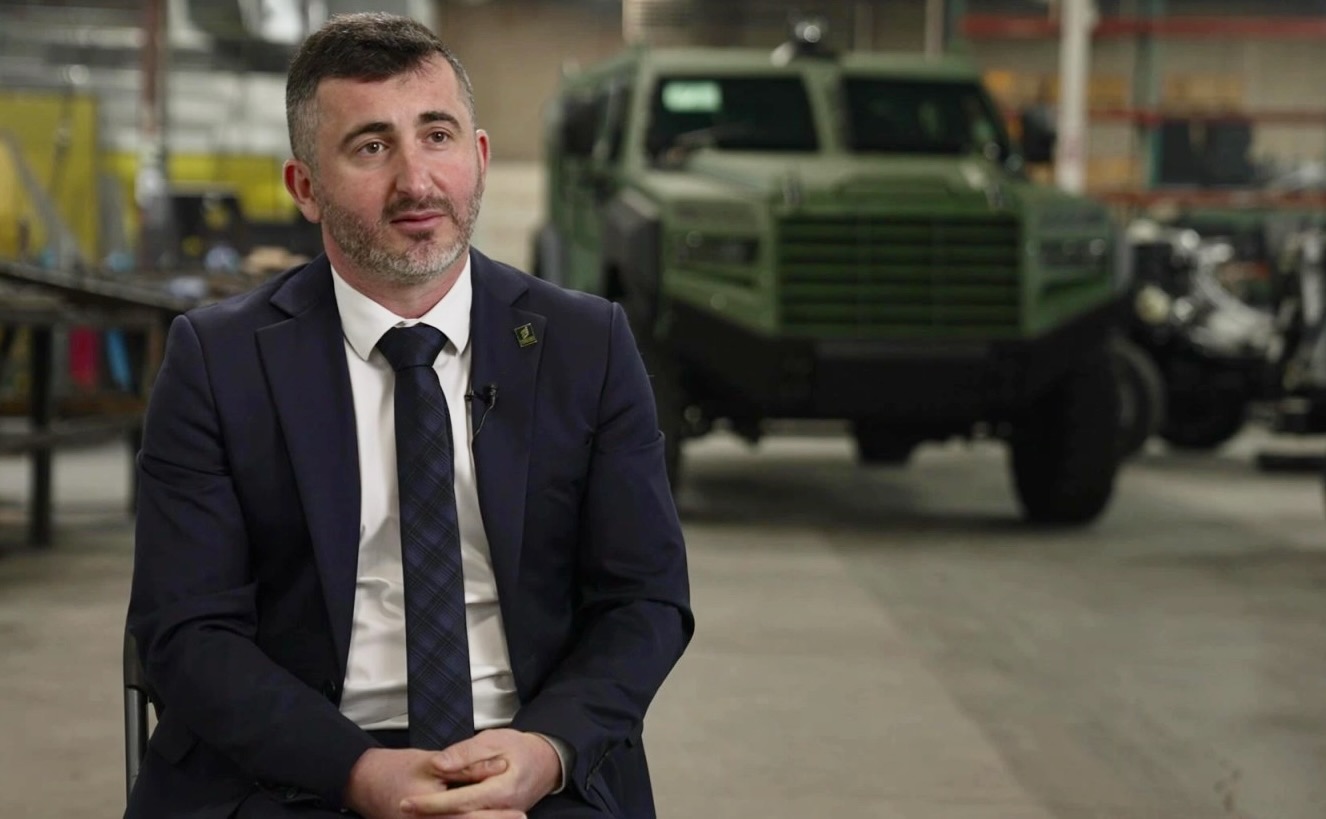Canada's Roshel company to produce armoured vehicles in Ukraine

The Canada-based company Roshel initially produced armoured vehicles for commercial use. However, modified versions of the Senator armoured personnel carriers (APCs) are now being used in combat operations in Ukraine. The vehicles are so useful that the company is setting up a plant in Ukraine.
The Canadian armoured vehicle manufacturer Roshel can be considered part of the Ukrainian defence industry. Every second armoured vehicle produced by this company is sent to the Armed Forces of Ukraine or other law enforcement agencies in Ukraine, and a third of the workers at its factories are refugees from Ukraine.
Roshel has supplied 1,140 Senator vehicles to Ukraine’s defence forces to date, making them one of the most common model of armoured vehicles used in the Russo-Ukrainian war. Over the past two years, the Canadian company has acquired partners and connections in Ukraine, and its products have gained considerable combat experience.
Soon, the company will become legally part of Ukraine's defence industry and benefit the national economy. Roshel is planning to invest tens of millions of dollars in its plant in Ukraine and even employ some Ukrainian refugees who currently work for the company in Canada.
Roshel CEO Roman Shimonov is convinced that the future plant will not only be able to compete with local producers on the Ukrainian market but will also sell armoured vehicles to Europe, bringing in foreign currency to Ukraine.
Roshel conquers the Ukrainian market
Roman Shimonov used to live in Israel and was a military officer, but 12 years ago, he moved to Canada. In 2016, Shimonov founded Roshel, a company that modernised vehicle fleets and sold cash-in-transit and armoured vehicles. The emerging manufacturer quickly took over the market in the neighbouring United States.
Roshel's clientele comprises a diverse range of American organisations: the Texas Police, the Department of State, the Customs and Border Protection, and even NASA. As it turned out, space explorers also need armoured vehicles to protect their astronauts and hundreds of millions of dollars worth of technology.

The firm also has clients in Canada, Israel, and various multinationals. By 2022, Roshel was producing 1,200 vehicles annually, including those used for cash-in-transit . It now plans to increase production to 2000 per year.
It's no mystery why the production of armoured vehicles has skyrocketed. The demand for them by the Armed Forces of Ukraine is enormous – they are used for medical evacuation, personnel movement, cargo delivery and even assaults. Western partners and Ukraine alike are ready to buy them using their own funds.
The Canadian government purchased the first eight vehicles from Roshel's warehouses for the Ukrainians in the first weeks of the Russian invasion. Later, Czechia financed the purchase of 70 more units. The Senator was initially positioned as a vehicle for personnel evacuation and transportation, rather than for combat operations.
The Senator had to evolve to gain a foothold in the Ukrainian market. From being an armoured vehicle for astronauts and peaceful American cities, it had to be transformed into an actual combat unit capable of constantly driving through mud and under fire.
For this purpose, Shimonov sent his people to Ukraine to collect operator feedback, take photos and file reports with head office.
A year later, Roshel presented a Mine-Resistant Ambush Protected (MRAP) version of the Senator, i.e., a full-fledged frontline vehicle. The company had never done that before. According to Shimonov, the vehicle has undergone thousands of different design changes since the basic version.

The Senator MRAP is a military armoured vehicle built on the civilian Ford F550 chassis. Thanks to its affordability and reliability, it is the most popular chassis for armoured vehicles.
The Ukrainian Armor defence company utilises the same Ford chassis to construct its Novator armoured vehicles, while the Practika defence company employs them to manufacture its Kozak-5 APCs.
The Senator MRAPs have been tested to NATO standards and have STANAG 2 ballistic protection and STANAG 3 blast protection certificates. This means that they can withstand a 7.62mm round from 30 metres, an 8kg explosive blast, and a 155mm high explosive shell impact at 80 metres. It is incredibly challenging – or even impossible – to squeeze more out of an armoured vehicle on a civilian chassis.

The Senator MRAP is now the company's main product. The less protected civilian version of the armoured vehicle has also been upgraded for Ukraine, with reinforced axles, mine-resistant seats and a less "environmentally friendly" engine that runs on conventional diesel.
Ukraine has both civil and military versions of these vehicles in service. Some of them are being converted into command and control vehicles.
Ukrainian soldiers' reviews of the Senator armoured vehicle range from positive to critical, as is typical for any armoured vehicle. However, to establish a good reputation and secure a position in the market, it's not only the vehicle's features that matter but also the capability to conduct swift repairs. To address this need, Roshel has established partnerships and sizable workshops in Ukraine dedicated to repairing and overhauling hundreds of armoured vehicles.
Roshel's strength is also its extensive inventory. The company keeps 100 armoured vehicles in storage at all times so it can deliver them to Ukraine within a month after they are ordered.
It seems that Ukraine's General Staff considers the Canadian-made vehicles to be essential and the manufacturer to be quite reliable, as Ukraine's Defence Ministry purchases Roshel's products directly, alongside domestically produced Kozaks and Novators. However, most of the Canadian armoured vehicles are still supplied to Ukraine through Western partners.
At present, 140 armoured vehicles are assembled at Roshel plants monthly, with half of them being shipped to Ukraine. A total of 1,140 armoured vehicles have been delivered as of the end of May 2024.

Thanks to the Ukrainian market and the experience gained in the Russo-Ukrainian war, Roshel has gained growth potential and has begun to make extensive investments. The company announced in March 2024 that it would allocate US$65 million to building a new headquarters and industrial facility in Canada.
The manufacturer has openly announced its expansion plans in the US and the EU. For example, Roshel is trying to take over a German contract for 400 armoured vehicles for Ukraine, as the German company, FFG, is failing to meet delivery deadlines.
In discussions with the Germans, Shimonov immediately played his cards right: he proposed to set up a factory in Germany, emphasised that his armoured vehicles are only half the price, and mentioned the availability of large stocks, thanks to which a certain number of APCs could be shipped to Ukraine immediately.
Shimonov has not revealed what the Germans said, but Germany is not the only possible entry point to the European market. Roshel plans to set up a plant in Ukraine to produce armoured vehicles for the domestic market there and then export them to other countries.
What will Roshel's Ukrainian plant be like?
It will not be easy for Canadians to compete in the Ukrainian market. According to Vladyslav Belbas, CEO of Ukrainian Armor, domestic producers are able to meet the Ukrainian Armed Forces' need for armoured vehicles on their own, and they cost 20-30% less than foreign ones. Ukrainian designers are just as close to the front and are constantly improving their products.
However, Roshel is not afraid of competition. According to Shimonov, the decision to locate production in Ukraine has already been made. He did not disclose any other details, but the company plans to invest "tens of millions of dollars" and create "hundreds" of new jobs at the new facility.

In addition to its proximity to the main operator, the company views Ukraine as a favourable business climate for building defence companies and further expanding into the European market.
Shimonov observed that "Ukraine has a strong infrastructure left over from the days before the collapse of the USSR, and not all of it is being used effectively. You have cheap electricity, labour, production chains that are now being built, and many people educated to university level and beyond. When we hire Ukrainians, we see a big difference compared to people from other regions with no production culture.
After the war, Ukraine will take centre stage in the region, and people will invest in it. Those companies that manage to gain a foothold here will be the most competitive in the European market," he predicted.
Roshel has first-hand experience in collaborating with Ukrainians, with over 200 of its 500+ employees being immigrants or temporary migrants from Ukraine.
Coincidentally, the company is now actively recruiting new employees, and Ukrainians were looking for work after moving to Canada. Many of them possess the technical expertise Roshel needs.

"We have an employee from Ukraine who has been engaged in producing armoured vehicles since the beginning of the invasion. When an attack on one of the Ukrainian cities took place, his mother was evacuated using our vehicle. Thus, we have come full circle," says Shimonov.
Shimonov says that many Ukrainian employees express a desire to come back to their homeland and be helpful there. Some of them will be able to get jobs at the new Ukrainian plant.
The company is taking precautions against possible Russian strikes on the new plant and is ready to do everything to prevent the Russians from discovering how the production chain is organised.
Shimonov noted that when the company commenced operations in Ukraine, it immediately began receiving strange proposals. "We receive a lot of letters and calls saying that we will be introduced to someone or given some kind of opportunity. However, we are very strict about engaging only with official representatives through written communication," he said.
Whether those sorts of proposals come from fraudsters or real representatives of certain groups of officials is unknown. But Roshel makes it clear that it will do business according to the standards of Western countries.
For reference: According to the Canadian National Post newspaper, after his dismissal, former company manager Anton Sestritsyn accused Roshel’s management of paying a bribe to a Ukrainian official to facilitate the conclusion of a contract.
Ekonomichna Pravda asked Shimonov about this incident. Shimonov explained that the Canadian authorities had audited the company after the scandal and revealed no violations and that a counterclaim for defamation had been filed against Sestritsyn.
First, the Armed Forces of Ukraine receive Western equipment, then the manufacturing company begins to service it on-site and eventually the firm builds its own plant here. This scheme will see many more Western defence companies open in Ukraine.
To attract and retain these investments, the Ukrainian government must protect Ukrainian defence plants not only from Russian missiles but also from unreasonable searches, data disclosures and cases of corruption.
By Bohdan Miroshnychenko, Ekonomichna Pravda
Translation: Artem Yakymyshyn
Editing: Monica Sandor